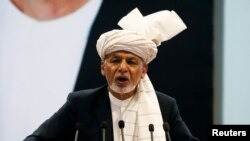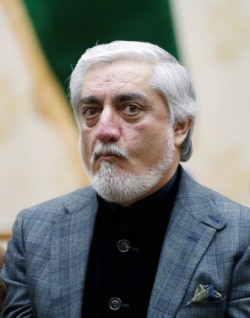The Afghan government said Friday that it was worried about an escalation of violence in the region after the U.S. airstrike in Iraq overnight that killed Iran Quds Force commander General Qassem Soleimani.
"We call on the Islamic Republic of Iran, our big neighbor, with whom we have extensive common language, religious, historic and cultural [values], and we call on the U.S., who is Afghanistan's strategic and fundamental partner, to prevent conflict escalations, and we hope that both sides solve their differences through negotiations," a presidential statement said.
The statement said that in a telephone conversation with U.S. Secretary of State Mike Pompeo, Afghan President Ashraf Ghani noted that his country's security agreement with the U.S. mandates that Afghan soil not be used against any foreign country.
Pentagon officials confirmed the strike on Soleimani in a statement late Thursday U.S. time, saying the action was carried out at the direction of U.S. President Donald Trump.
In a Facebook post, Afghanistan's chief executive of the National Unity Government, Abdullah Abdullah, lamented the death of Soleimani.
"We express our condolence about this occurrence to Sarda Soleimani's family, the government and people of Iran." Abdullah wrote on his official Facebook page.
He said that Iran has stood with the people of Afghanistan during times of war and strife and has been hosting millions of Afghan immigrants for many years.
At the same time, Abdullah called the U.S a "strategic partner" that has helped Afghanistan fight terrorism for almost two decades and has assisted the country with stability, reconstruction and governance.
"As a victim of terrorism and violence, Afghanistan calls for de-escalation of regional and international relations and hopes the latest incidents won't negatively affect the situation and cooperation of our friends and allies in Afghanistan," he added.
Afghan presidential candidate and former intelligence director Rahmatullah Nabil wrote in a tweet that Soleimani was a "proxy war mastermind in the region."
Nabil said Soleimani was an asset for Iran's national interests and a threat, adding that his death would increase tensions in the region.
Former Afghan President Hamid Karzai, meanwhile, condemned the fatal attack on Soleimani.
Karzai said Friday in a statement that the U.S. attack would escalate the conflict and hostility and harm efforts to bring peace and stability to the region.
Karzai extended his condolences to the Iranian government and people, calling Soleimani a "dignified man who sought peace and stability in Afghanistan."





